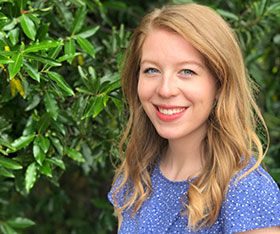Kailey Wyman, M.S.

Kailey Wyman
Research Brewing Apprentice
Mark Anthony Brewing
BS, Chemistry, concentration in Medicinal Chemistry, Augusta University
MS, Biomolecular Science, concentration in Medicinal Chemistry, Augusta University
Kailey Wyman’s fascination with medicinal chemistry began in high school. It’s amazing how something as small as a molecule in a drug compound can have such a profound effect on the human body, she says.
As an undergraduate and master’s student of medicinal chemistry, she enjoyed learning about how individual drugs target specific protein binding pockets. And she loved the process of synthesizing new drugs.
But as she was figuring out how to put her chemistry skills into practice, an unexpected job posting popped up on her Indeed job notifications: Research Brewing Apprentice.
She decided to go for it. Today, Wyman works for Mark Anthony Brewing, a global manufacturer of many well-known brands, including Mike’s Hard Lemonade and White Claw.
Much like her chemistry studies, Wyman’s brewery career involves experimentation—figuring out, for example, how a new yeast or can liner impacts the flavor of the beverage. It is really rewarding to be able to hold your own product in a can, says Wyman.
New challenges can feel overwhelming at times. But you just have to be open-minded and go with it—that’s the best way to learn.
What inspired you to join the brewing industry?
As much as I enjoyed synthetic chemistry, I wanted to see what else could be out there. My father had always been interested in microbreweries and distilleries, and my own fascination with brewing was beginning to grow as well. I’m very fortunate to work in the industry that I do because I get many opportunities to sample different mixes and formulations of beer and other beverages, and learn about how all of these products are made.
What is your current role at Mark Anthony Brewing?
I work in the pilot brewery department, which is housed within the company’s larger manufacturing facility that spans 1.4 million square feet in Columbia, South Carolina. In the pilot brewery, we test different formulations of products. We make sure, for example, that adding a new ingredient doesn’t cause an off-flavor or prompt the beverage to oxidize too quickly if the can is exposed to heat.
As a research brewing apprentice, I’m responsible for learning the entire process of brewing—everything from sales and finance to how to mix liquids in cans and get them packed out. There is always something new to figure out—like how a specific form of filtration works with particular reverse-osmosis membranes or the logistics of shipping a pallet of beer across the country. New challenges can feel overwhelming at times. But you just have to be open-minded and go with it—that’s the best way to learn.
Does your prior research in medicinal chemistry help you in your current profession in any way?
Yes! As an undergraduate, I worked in a green synthetic chemistry lab with a professor who was developing a more environmentally friendly way to synthesize Zyrtec. That work inspired me to always look for greener ways to produce any product—whether it is trying to find greener chemicals to use for cleaning our brewing equipment or compostable materials for wrapping our pallets. Sustainability is massively important to me.
Also, for every test we run in the pilot lab, we have to scale down the recipe used by the larger manufacturing facility. It’s very much like running an organic chemistry experiment. You have to do a lot of conversions to figure out how much of each ingredient will go in. Then we tweak that recipe to incorporate whatever new ingredient or approach the company is considering.
My chemistry education also taught me a lot about troubleshooting instrumentation issues. Our pilot brewery has its own analytical instruments for testing things like CO2 carbonation levels and ABV to confirm alcohol percentages. I’m responsible for figuring out how to assemble, run, and take care of the instruments.
Where do you see your career path taking you next?
I would love to stay with this company for a long time. The Research Brewing Apprenticeship is a 3-year program. So in a year and a half, I’ll have the opportunity to move into a management position in a department of my choosing. I’m considering going into quality analysis, which would mean I could continue to work with chemistry instrumentation. Or I might go into production in the distillery department—so making hard alcohol. There are so many possibilities in this field.

